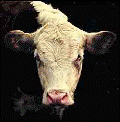Animal Science, Department of

Department of Animal Science: Dissertations, Theses, and Student Research
Date of this Version
Summer 8-2015
Document Type
Dissertation
Citation
Pesta, A. C. 2015. Dietary strategies for the mitigation of methane production by growing and finishing cattle. Ph.D. Diss. Univ. of Nebraska-Lincoln.
Abstract
Interest in reducing methane (CH4) emissions by cattle has increased recently. Loss of feed energy as CH4 represents both an environmental concern and an energetic loss to the animal. Manipulation of dietary composition has proven to be an effective mitigation strategy. Experiments were conducted to evaluate the effect of several dietary characteristics on CH4 production in growing and finishing cattle, and to develop a novel, non-invasive method for quantifying emissions from animals in a production setting. Short-term gaseous emissions of CH4 and carbon dioxide (CO2) were measured and the CH4:CO2 was used in an equation with diet and performance characteristics to calculate daily CH4 production. Additionally, two calorimetry experiments were conducted to compare results from the new method with previous calorimetry methods. Forage quality, by-product inclusion, and use of monensin were evaluated in diets fed to growing cattle; and diet quality was the main determinant of CH4 production. Animals consuming high quality forage or 40% distillers grains produced a greater amount of CH4, and had improved daily gains and feed efficiency compared with those consuming low quality forage or no distillers grains. Impact of monensin on CH4 emissions was only detected in low quality forage and appeared to be dependent on growing diet type. In finishing diets, fat source, inclusion of by-products, use of monensin, and use of nitrate and sulfate were evaluated. Methane production was unaffected by source of dietary fat or presence of monensin. The effect of inclusion of 50% distillers grains was variable between the short-term measurement-based calculated estimate and the calorimetry method. Additionally, a nitrate × sulfate interaction was observed in which addition of either nitrate or nitrate and sulfate in combination had no impact on emissions, but sulfate alone increased the ratio of CH4 to CO2 in finishing diets. The newly developed method was able to detect treatment differences, however degree of agreement with calorimetry data was variable. These data suggest that diet does impact CH4 emissions but effect of some interventions may depend on the basal diet type. There appears be more opportunity to impact CH4 production in growing compared to finishing diets.
Advisors: Samodha C. Fernando and Galen E. Erickson
Included in
Bioresource and Agricultural Engineering Commons, Ecology and Evolutionary Biology Commons, Meat Science Commons, Other Animal Sciences Commons


Comments
A DISSERTATION Presented to the Faculty of The Graduate College at the University of Nebraska In Partial Fulfillment of Requirements For the Degree of Doctor of Philosophy, Degree: Animal Science (Ruminant Nutrition), Under the Supervision of Professors Samodha C. Fernando and Galen E. Erickson. Lincoln, Nebraska: August, 2015
Copyright (c) 2015 Anna C. Pesta